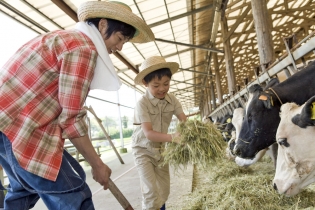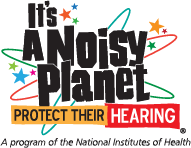
Have you ever visited a farm? We often picture farms as quiet pastures with birds chirping and cows mooing, but in reality farms can be quite noisy. If you live or work on a farm, you know that the barnyard isn’t always a quiet place. In fact, the combination of tractors and other machinery with the sounds of farm animals can create a noisy environment that puts your hearing at risk. Pig squeals alone can reach 100 A-weighted decibels (dBA)—about as loud as a lawnmower! Farm machines can get very loud, too: a tractor without a cab can reach 100 dBA, and chainsaws can reach 110 dBA—about the same noise level as a loud concert or sporting event.
Scientists recommend that you use hearing protectors when you are in places where the noise level is at or above 85 decibels. Very loud noises, even if they last for only a short time, can cause immediate hearing damage. If you live or work on a farm, or you plan to visit a farm this fall, Noisy Planet wants to help you protect your hearing with some useful tips to keep the volume down.
- Be aware of noise levels that put hearing at risk. If you are around a piece of farm equipment and you have to shout to be heard over the noise, then the noise is too loud and you should likely be wearing hearing protectors. Any noise that leaves a ringing or buzzing sound in your ears is too loud for any length of time without hearing protectors.
- Choose hearing protectors that will work for you, and get comfortable using them. Earplugs and earmuffs reduce harmful levels of sound. Although carrying on a conversation may be more difficult in some situations, you will still be able to hear warning signals, which is very important for safety. You can try earmuffs before you buy them to ensure that the fit is right.
- Point out situations where family members should practice hearing safety. Do chores or other activities away from noisy equipment when possible, and wear hearing protectors when you need to be near noisy equipment.
Last Updated Date



